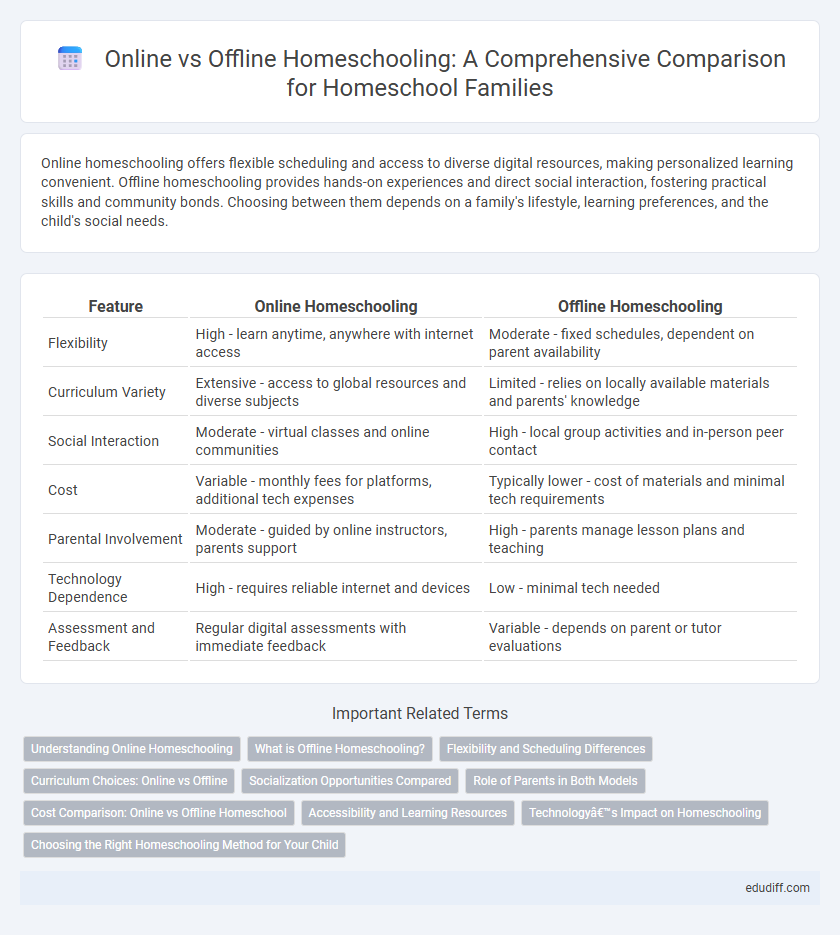Online homeschooling offers flexible scheduling and access to diverse digital resources, making personalized learning convenient. Offline homeschooling provides hands-on experiences and direct social interaction, fostering practical skills and community bonds. Choosing between them depends on a family's lifestyle, learning preferences, and the child's social needs.
Table of Comparison
| Feature | Online Homeschooling | Offline Homeschooling |
|---|---|---|
| Flexibility | High - learn anytime, anywhere with internet access | Moderate - fixed schedules, dependent on parent availability |
| Curriculum Variety | Extensive - access to global resources and diverse subjects | Limited - relies on locally available materials and parents' knowledge |
| Social Interaction | Moderate - virtual classes and online communities | High - local group activities and in-person peer contact |
| Cost | Variable - monthly fees for platforms, additional tech expenses | Typically lower - cost of materials and minimal tech requirements |
| Parental Involvement | Moderate - guided by online instructors, parents support | High - parents manage lesson plans and teaching |
| Technology Dependence | High - requires reliable internet and devices | Low - minimal tech needed |
| Assessment and Feedback | Regular digital assessments with immediate feedback | Variable - depends on parent or tutor evaluations |
Understanding Online Homeschooling
Online homeschooling offers flexible, personalized learning environments using digital platforms that provide interactive lessons and real-time feedback. It enables access to diverse curriculum options and resources unavailable in traditional offline homeschooling, enhancing educational opportunities for students. Tracking progress and adapting teaching methods is streamlined through integrated software, promoting efficient and measurable outcomes.
What is Offline Homeschooling?
Offline homeschooling refers to educating children at home without relying on internet-based resources or digital platforms. It often involves traditional methods such as printed textbooks, workbooks, hands-on activities, and in-person interactions directly between parents and students. This approach emphasizes face-to-face instruction, personalized lesson plans, and offline educational materials tailored to the learner's pace and style.
Flexibility and Scheduling Differences
Online homeschooling offers unparalleled flexibility by allowing students to access lessons anytime and tailor their learning pace, fitting education around family schedules and extracurricular activities. Offline homeschooling typically requires set times for instruction and activities, often dependent on parental availability and organized environments. This scheduling difference makes online homeschooling ideal for families needing adaptable routines, while offline homeschooling may suit those who prefer structured, consistent daily schedules.
Curriculum Choices: Online vs Offline
Online homeschooling offers a wide range of curriculum choices including interactive digital content, multimedia lessons, and customizable pacing tailored to individual learning styles. Offline homeschooling typically relies on traditional textbooks, printed workbooks, and teacher-guided instruction, which can provide a more structured and tactile learning experience. Both methods allow parents to select curricula aligned with educational standards, but online options often grant greater flexibility in subject variety and real-time updates.
Socialization Opportunities Compared
Online homeschooling offers diverse virtual socialization opportunities through interactive platforms, online clubs, and global peer groups, enhancing digital communication skills. Offline homeschooling supports face-to-face interactions via local co-ops, community activities, and extracurricular programs, fostering in-person interpersonal development. Both methods present unique socialization benefits, with online focusing on digital connectivity and offline emphasizing direct social engagement.
Role of Parents in Both Models
Parents in online homeschooling act as facilitators by managing digital resources, monitoring virtual lessons, and ensuring consistent engagement with interactive platforms. In offline homeschooling, their role extends to direct instruction, curriculum customization, and hands-on supervision of daily activities, fostering personalized learning experiences. Both models require active parental involvement but differ in methods of delivery and oversight, highlighting adaptability in educational support based on the chosen homeschooling approach.
Cost Comparison: Online vs Offline Homeschool
Online homeschooling typically offers lower overall costs due to reduced expenses for transportation, physical materials, and facility fees compared to offline homeschooling. Offline homeschooling may incur higher costs from purchasing textbooks, educational supplies, and paying for extracurricular activities or tutoring services. Families often find online homeschooling more budget-friendly while maintaining access to diverse curriculum options and interactive learning tools.
Accessibility and Learning Resources
Online homeschooling offers greater accessibility by enabling students to learn from any location with internet access, providing flexible scheduling that accommodates diverse family needs. Digital platforms supply extensive learning resources including interactive lessons, multimedia content, and instant updates, enhancing engagement and personalization. Offline homeschooling relies on physical materials and local resources, which may limit the breadth and immediacy of available educational content compared to online alternatives.
Technology’s Impact on Homeschooling
Technology has transformed homeschooling by providing online platforms that offer interactive lessons, diverse resources, and real-time communication with teachers, enhancing personalized learning experiences. Offline homeschooling relies on traditional methods and physical materials, which can limit access to up-to-date content and collaborative tools. The integration of digital technology in homeschooling increases flexibility, engagement, and educational enrichment, making online homeschooling a dynamic alternative to conventional offline approaches.
Choosing the Right Homeschooling Method for Your Child
Choosing the right homeschooling method depends on your child's learning style, social needs, and access to resources. Online homeschooling offers flexibility, diverse curriculum options, and interactive digital tools, while offline homeschooling allows for personalized, hands-on activities and direct parental involvement. Evaluating your child's preferences and your family's schedule ensures the most effective and supportive educational environment.
Online Homeschooling vs Offline Homeschooling Infographic

 edudiff.com
edudiff.com